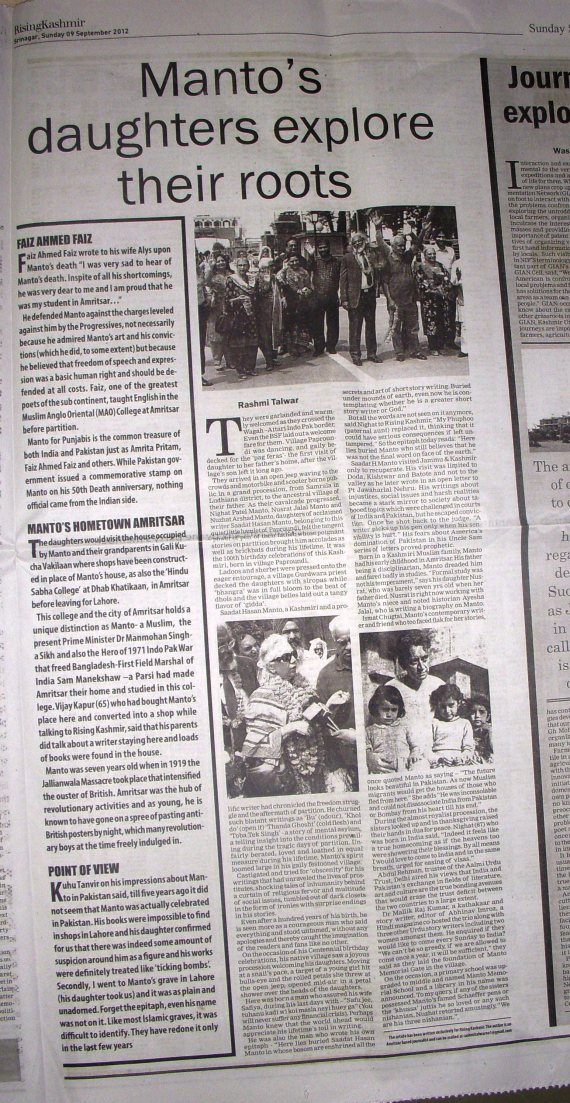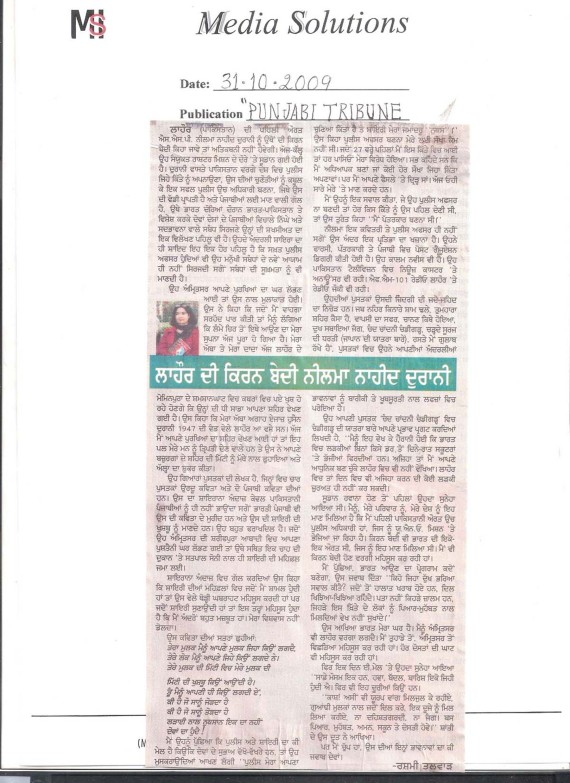
Manto’s Daughters warmly welcomed in India
Manto’s Daughters explore their roots
BY Rashmi Talwar
AMRITSAR SEPTEMBER 8, 2012–They were garlanded and warmly welcomed as they crossed the Wagah –Attari Indo Pak border. Even the BSF laid out a welcome fare for them. Village Paproundi was dancing, and gaily bedecked for the ‘pag feras’- the first visit of daughter to her father’s home, after the village’s son left it long ago.

Saadat Hassan Manto–One of the greatest short story writers during Partition of 1047
They arrived in an open jeep waving to the crowds and motorbike and scooter borne public in a grand procession, from Samrala in Ludhiana district, to the ancestral village of their father. As their cavalcade progressed Nighat Patel Manto, Nusrat Jalal Manto and Nuzhat Arshad Manto, daughters of acclaimed son of the soil Saadat Hasan Manto, belonging to this quiet little hamlet of Paproundi, felt the tangent ‘power of pen’ of their writer father, whose poignant stories on partition brought him accolades as well as brickbats during his lifetime. It was the 100th birthday celebrations of this Kashmiri, born in village Paproundi .
Ladoos and sherbet were pressed onto the eager entourage, a village Gurdwara priest decked the daughters with siropas while ‘bhangra’ was in full bloom to the beat of dhols and the village belles laid out a tangy flavour of ‘gidda’
Saadat Hasan Manto, a Kashmiri and a prolific writer had chronicled the freedom struggle and the aftermath of partition and churned such blatant writings as ‘Bu’ (odour), ‘Khol do’ (open it ) ‘Thanda Gosht’ (cold flesh) and ‘Toba Tek Singh’ -a story of mental asylum, a telling insight into the conditions prevailing during the tragic days of partition,. Unfairly berated, loved and loathed in equal measure during his lifetime, today Manto’s spirit loomed large in his gaily festooned village.
Castigated and tried for ‘obscenity’ for his writings that had unravelled the lives of prostitutes , besides which came tales of shocking inhumanity behind a curtain of religious fervour and multitude social issues, more tumbled out of dark closets in the form of ironies with surprise endings, in his stories.
Even after a hundred years of his birth, he is seen more as courageous man who told all, took all and remains untamed, without any apologies and thereby caught the imagination of the readers and fans like no other.
Manto was born in 1912 and celebrating the centennial of Manto’s birthday this year, his village sees a joyous procession welcoming his three daughters. Moving at a snail’s pace, a target of a young girl hit bulls-eye and the rolled petals she threw at the open jeep, opened mid-air in a petal shower over the heads of the daughters.
Here was born a man who had soothed his wife Safiya’s worried brow during his last alcoholic poverty ridden days with –“Safu jee, tuhanu kadi wi koi masla neyi huey ga” (you will never suffer any financial crisis) perhaps Manto knew that the world ahead would appreciate his lifetime’s toil in writing.
He was also the man who wrote his own epitaph-“Here lies buried Saadat Hasan Manto in whose bosom are enshrined all the secrets and art of short story writing. Buried under mounds of earth, even now he is contemplating whether he is a greater short story writer or God.”
But all the words are not seen on it anymore, said Nighat to Rising Kashmir –“My phuphoo (paternal aunt) replaced it, thinking that it could have serious consequences if left un-tampered”. So the epitaph today reads: “Here lies buried Manto who still believes that he was not the final word on the face of the earth.”
Manto, a writer ahead of his times, came to the state of Jammu &Kashmir only to recuperate and visited Doda, Kishtwar and Batote but could never visit the Kashmir valley as he later wrote in an open letter to Pt Jawaharlal Nehru.
His writings about injustices, social issues and harsh realities became a stark mirror to society about tabooed topics and these were challenged in courts in India and Pakistan, but he escaped conviction. Once he shot back to the judge, “A writer picks up his pen only when his sensibility is hurt.” His fears about America’s domination of Pakistan in his Uncle Sam series of letters proved, prophetic.
Born to a Kashmiri Muslim family, Manto had his early childhood in Amritsar. His father being a disciplinarian, Manto dreaded him and fared badly in studies. “Formal study was not his temperament” says his daughter Nusrat, who was barely 7-years when her father died but gathered the tit bits on her father from his friends. Nusrat is also working with Manto’s niece and noted historian Ayesha Jalal, who is writing a biography of Manto.
Ismat Chugtai, Manto’s contemporary writer and friend who too faced flak for her stories once quoted Manto as saying – “The future looks beautiful in Pakistan. As now Muslim migrants would get the houses of those who fled from here.” She adds “He was inconsolable and could not disassociate India from Pakistan or Bombay from his heart till his end.”
During the almost royalist procession the sisters looked up and in thanksgiving raised their hands in dua for peace, Nighat (67) who was born in India said ‘Indeed it feels like a true homecoming’ as if the heavens too were showering their blessings. By all means I would love to come to India and in the same breath, urged for easing of visas’.
Abdul Rehman, Trustee of the Aalmi Urdu Trust, Delhi aired his views that India and Pakistan‘s exchange in fields of literature, art and culture are the true bonding avenues that would erase the trust deficit between the two countries to a large extent.
Dr Mallik Raj Kumar a kathakaar and story writer, editor of Abhinav Imroz, a Hindi magazine who co-hosted the trio along with three other Urdu story writers including two women amongst them, queried if they would like to come every Sunday to India? To which they laughed ‘We can’t be so greedy, if we are allowed to come once a year, which would be sufficient’, they said as they laid the foundation of Manto Memorial Gate in the village. A primary school to be upgraded to Middle and named Manto Memorial School and a library in his name was broadcast to people of the village from the stage. To my query, if any of the sisters possessed Manto’s famed Schaeffer pens or the ‘khussa’ juttis he so loved or any such nishanian – Nuzhat retorted amusingly – “We are his three nishanian”
Xxxxxxxxxxxxxxxxxx
BOX –A

Manto’s daughters from Pakistan
Faiz Ahmed Faiz
Faiz Ahmed Faiz wrote to his wife Alys upon Manto’s death “I was very sad to hear of Manto’s death. Inspite of all his shortcomings, he was very dear to me and I am proud that he was my student in Amritsar…”
He defended Manto against the charges levelled against him by the Progressives, not necessarily because he admired Manto’s art and his convictions (which he did, to some extent) but because he believed that freedom of speech and expression was a basic human right and should be defended at all costs. Faiz, one of the greatest poets of the sub continent, taught English in the Muslim Anglo Oriental (MAO) College at Amritsar before partition.
Manto for Punjabis is the common treasure of both India and Pakistan just as Amrita Pritam, Faiz Ahmed Faiz and others. While Pakistan government issued a commemorative stamp on Manto on his 50th Death anniversary, Indian officialdom did not bother for the celebrated writer, born as he was in India.
xxxxxxxxxxxxxxxxxxxxxxxxxxxxxx
BOX- B
Manto’s hometown Amritsar

Kucha Vakilan in Amritsar where Manto stayed
The daughters would visit the house occupied by Manto and their grandparents in Gali Kucha Vakilaan where shops have been constructed in place of Manto’s house, as also the ‘Hindu Sabha College’ at Dhab Khatikaan, in Amritsar before leaving for Lahore.
This college and the city of Amritsar holds a unique distinction as Manto- a Muslim, the present Prime Minister Dr Manmohan Singh- a Sikh and also the Hero of 1971 Indo Pak War that freed Bangladesh-First Field Marshal of India Sam Manekshaw –a Parsi had made Amritsar their home and studied in this college . Vijay Kapur (65) who had bought Manto’s place here and converted into a shop while talking to Rising Kashmir, said that his parents did talk about a writer staying here and loads of books were found in the house.
Manto was seven years old when in 1919 the Jallianwala Massacre took place that intensified the ouster of British and spelled freedom for India. Amritsar was the hub of revolutionary activities and as a young he is known to have gone on a spree of pasting anti British posters by night, which many revolutionary boys at the time freely indulged in.
Xxxxxxxxxxxxxxxxxxxxxxxxxxxx
BOX-C
Point of view

Hindu Sabha College in Amritsar where Manto and many greats studied including Sam Manekshaw, PM Dr Manmohan Singh
Kuhu Tanvir on his impressions about Manto in Pakistan said, till five years ago it did not seem that Manto was actually celebrated in Pakistan. His books were impossible to find in shops in Lahore and his daughter confirmed for us that there was indeed some amount of suspicion around him as a figure and his works were definitely treated like ‘ticking bombs’ (which they are!).
Secondly, I went to Manto’s grave in Lahore (his daughter took us) and it was as plain and unadorned. Forget the epitaph, even his name was not on it. Like most Islamic graves, it was difficult to identify. They have redone it only in the last few years.
FIRST PUBLISHED IN RISING KASHMIR
31.630890
74.871552


















Recent Comments